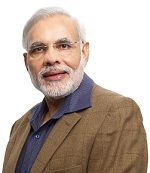Legislation pending in India's parliament that would draw a sharp line between medical devices and drugs is welcome, the Indian arm of a key industry body for devices told the Economic Times, and passage could come in the next session of parliament due to start this week.
The Drug and Cosmetics Bill is "historic because it creates a distinction between drugs and medical devices for the first time in India's legislative history," Sanjay Banerjee, chair of AdvaMed India, told the Economic Times.
AdvaMed, or the Advanced Medical Technology Association, represents nearly 300 members across Europe, India, China, Brazil, and Japan, according to its website. The group claims it produces nearly 90% of the healthcare technology purchased annually in the United States and more than 40% purchased annually around the world.
 |
| Indian Prime Minister Narendra Modi |
The government of Prime Minister Narendra Modi that came to power in May last year has looked at medical devices as a key component of its "Make in India" manufacturing focus.
At the same time, price checks by India's National Pharmaceutical Pricing Authority (NPPA) on certain orthopedic implants have once again raised hackles by multinational companies concerned they are being swept up in a law that was not meant for their industry, the Economic Times reports.
In June, the NPPA reportedly asked Johnson & Johnson ($JNJ), Zimmer ($ZMH) and Stryker ($SYK) to submit details of production and pricing of their products, including those for knee and hip, with stents also in focus on concerns that imports are considerably more expensive than domestic brands.
In fact, medical device regulation has grown as a topic in Asia with the April launch of the Asia Pacific Medical Technology Association, or APACMed, that aims to work with regulators across a region on issues ranging from import rules to public tender guidelines.
The association includes Johnson & Johnson, Abbott ($ABT), GE Healthcare ($GE) and Boston Scientific ($BSX) with hopes for local companies to join too. It is based in Singapore where many companies set up regional administration and distribution hubs.
In India, Banerjee told the Economic Times that separate medical device regulation is also important for patients.
"We believe that by establishing an appropriate regulatory framework for medical devices, it will enable industry to better address the needs of Indian patients," Banerjee was quoted as saying by the Economic Times. AdvaMed said that of 14,000 types of medical devices that exist, only 22 are on India's list and are treated as drugs.
"The obfuscation of the two categories in India has created ambiguity about safety standards and quality control, and limited the ability of the medical device industry to address issues of access, availability, affordability and safety," according to a statement from AdvaMed cited by the Economic Times.
"It will ensure quality of medical devices, patient safety and remove bottlenecks to easy availability. It will grow domestic manufacturing capacity, allow domestic industry to compete globally and incentivize international industry to invest and 'Make in India.'"
AdvaMed sees room for the legislation, in the works since 2013, to finally be passed in India's monsoon session of parliament starting Tuesday, the longest of three sessions usually held each year. It runs from July to September when the annual southwest monsoon rains sweep the Asian subcontinent.
- here's the Economic Times story